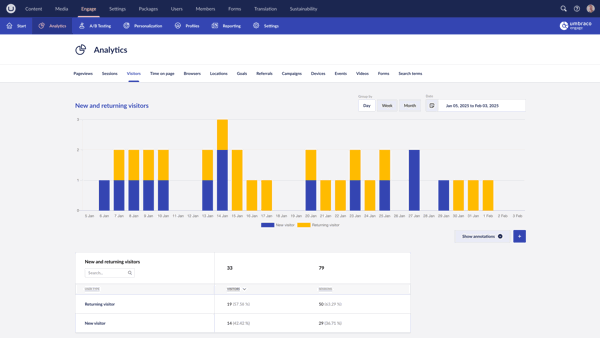Don’t be held back by legacy systems. Now is a better time than ever to re-platform
Customer experience is everything. Customers have more choice than ever when it comes to buying goods and services.
They’ll show no hesitation in switching to another provider if their experience with your business doesn’t match their expectations.
Nowhere is this more striking than your customers’ online engagement. By delivering a seamless customer experience you’re likely to win more business. Key to delivering the best possible digital experience to customers and gaining their loyalty is being able to personalise their journey.
“One in three consumers (32%) say they will walk away from a brand they love after just one bad experience.”
To do this, you should leverage the capabilities of an integrated digital experience suite, offered through a Cloud-based Content Management System (CMS). This platform can help you to meet changing demands head-on and provide a personalised experience that will satisfy your customers. In this guide, we take a look at how re-platforming to a new CMS can help you to deliver a seamless customer experience that will drive your business towards achieving its goals. We’ll help you to assess your current CMS, how re-platforming benefits CMO and CIOs, and why customer experience should be your priority.
Why it’s time to re-platform to a Cloud-based CMS that offers a digital experience suite
- Customers today demand a hassle-free and rewarding experience from their online engagements – or they will take their business elsewhere.
- However, some companies are using legacy systems that aren’t capable of delivering personalised experiences.
- Your business needs the functionality and interoperability of an integrated, Cloud-based CMS to meet increasing customer demands. A digital experience suite can help here.
- Now is a better time than ever to re-platform. This guide looks at the drivers behind re-platforming, why it’s crucial to gain a competitive advantage, and how partnering with a CMS implementation specialist can make the process seamless.
As your business grows it naturally has more complex requirements, placing greater demands on your CMS. It can become challenging to remain supported by a legacy system.
It can become challenging to remain supported by a legacy system.
Your business is also likely to undertake digital transformation projects as it recognises how technology can automate and simplify business processes. With an integrated platform, you can improve customer relationships, increase productivity, and save money.
Choosing to re-platform will bring your business and its customers far more benefits than remaining on a legacy CMS. Whether you’re a CIO or a CMO, it’s time to take advantage of new opportunities around technologies like the Cloud, Artificial Intelligence (AI), and comprehensive integration APIs. These features and benefits are provided by fully integrated digital experience suites that are supported by a Cloud-based CMS.

To deliver great customer experience, your business should take advantage of new technologies so you can make every interaction feel more personal.
More than a third of customers feel brands do not care enough about personalising their online experiences.
Before you consider re-platforming you should assess the capability of your existing system and how your customers rate their current experience. Below, we take a look at some critical signs that indicate that your current CMS is inhibiting digital growth. We’ll also explore how re-platforming to a Cloud-based CMS and using a digital experience suite can help you to create a profitable, digital presence.
Lack of personalisation
Despite its importance, many businesses still struggle with implementing a fully-featured, personalised customer experience.
More than a third of customers feel brands do not care enough about personalising their online experiences, causing them to feel disappointed, frustrated and distrustful.
A legacy system that prevents you from personalising the customer experience will leave you falling behind your competitors. There are multiple reasons that a legacy system does not lend itself well to personalisation, including disparate data, slow load times, and an inability to support multiple channels.

Failure to deliver an omnichannel experience
By 2020, the demand for an omnichannel customer experience will be amplified by the need for nearly perfect execution.
Today’s empowered customers expect seamless brand interactions across every touch point, forcing organisations to replace outdated thought-processes and legacy systems with new ways of doing business (Forrester’s Witcher).
Legacy systems that are only capable of pushing content out to websites is no longer good enough. Your customers are online everywhere, all the time. Omnichannel encompasses more channels than ever before. As technology quickly evolves and the Internet of Things (IoT) gains popularity, your CMS should evolve with it. You need an integrated platform that is capable of pushing content out to a variety of devices, from mobiles right through to wearables.
When re-platforming, consider a decoupled CMS that allows internal users to upload content and push it out to multiple devices, simultaneously. You should also consider scalability and resilience in the system you choose.

Risking compliance and leaving customers vulnerable
Another reason for companies to re-platform is to ensure GDPR compliance. This new regulation gives customers more control over their data.
Organisations that experience a breach will experience heavy financial penalties. To be GDPR-compliant, your CMS should not include or be co-located with applications which hold personal information.GDPR isn’t the only thing that you should be concerned about.
Business cybercrime up 63%. Your legacy systems are probably leaving your customer's data and your business secrets vulnerable to theft or loss. When re-platforming, choose a platform that has security built-in.

If you’re a marketer, you may feel that you are handcuffed to your legacy CMS. You know you need to prepare the business for the Internet of Things (IoT) devices, AI and Machine Learning to deliver great digital experiences to your customers.
A digital experience suite, built on a Cloud-based CMS, draws on Machine Learning to help marketers deliver the relevant content to people when and where they need it (Episerver).
However, you don’t want to be forced into building complicated marketing machines with hundreds of independently moving parts. The answer is a fully-functioning, integrated digital experience suite which puts control of the CMS into your hands. Put simply, you need one single view of your customers, with the ability to create a cohesive narrative across all channels. This will encourage customer loyalty, enable lead conversion and drive sales.
A digital experience suite, built on a Cloud-based CMS, draws on Machine Learning to help marketers deliver the relevant content to people when and where they need it. As a visitor interacts with your brand, AI-powered algorithms draw on their browsing history to present them with the most relevant content. This means you can spend time developing great content knowing that it will reach the right visitor, at the right time.
Benefits of re-platforming to an integrated, Cloud-based CMS include:
- A combination of content, commerce, multi-channel marketing and predictive analytics
- Automatic content recommendations based on a visitor’s past behaviour
- Adaptable to changing visitor patterns and campaigns through Machine Learning
- Ability to present individualised content in multiple channels, without complicated configuration
If you’re a CIO, your main focus is on the operational benefits that re-platforming can deliver including:
- Improved performance
- Security
- Elasticity
- Reliability
The 2017/2018 Logicalis Global CIO Survey found that legacy systems were top of mind for many of the 890 CIOs polled.
2017/2018 Logicalis Global CIO Survey found that legacy systems were top of mind for many of the 890 CIOs polled. Speed, security and reliability are benefits that you should look for when re-platforming to a new CMS – aspects that a legacy system can’t support.
To relieve some of this burden, work with a specialist implementation partner. You can define a service level agreement (SLAs) that matches the levels of corporate governance your business requires.

Benefits of re-platforming to an integrated, Cloud-based CMS include:
- Ability to handle sudden traffic spikes or seasonal variations
- Automatic scaling of resources around the clock
- Customers pay only for what they use
- It offers guaranteed availability with application SLA
- Get immediate access to new platform features
- Comes highly optimised out of the box
- Offers 365/24/7 support and monitoring

Delivering an improved customer experience is more than simply redesigning your website or making your legacy CMS work harder. It’s about re-platforming, taking advantage of a digital experience suite and building a profitable online presence that creates great customer experiences.
Choosing a trusted and experienced implementation partner that has experience of Cloud-based .NET solutions is crucial to successfully re-platforming your CMS.
Independent, growing agencies will deliver their expertise through close and informal collaboration – becoming a true partner who can enable your growth beyond your CMS. Not only can they add value in terms of implementation, UX design and web development, but they can also offer creative, technical and digital experience.
A specialist partner will bring an interdisciplinary team to the table that can support integrations, test systems for performance and availability and provide ongoing support.






